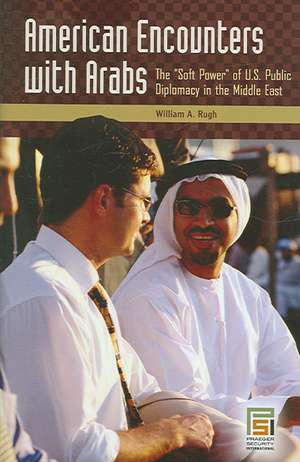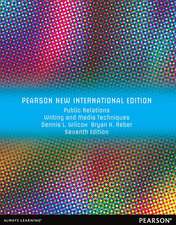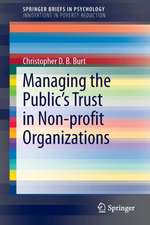American Encounters with Arabs: The Soft Power of U.S. Public Diplomacy in the Middle East: Praeger Security International
Autor William A. Rughen Limba Engleză Hardback – 29 noi 2005 – vârsta până la 17 ani
Din seria Praeger Security International
- 18%
 Preț: 334.19 lei
Preț: 334.19 lei - 8%
 Preț: 335.53 lei
Preț: 335.53 lei - 34%
 Preț: 376.10 lei
Preț: 376.10 lei - 46%
 Preț: 443.64 lei
Preț: 443.64 lei - 29%
 Preț: 240.11 lei
Preț: 240.11 lei - 8%
 Preț: 304.56 lei
Preț: 304.56 lei - 34%
 Preț: 373.82 lei
Preț: 373.82 lei - 19%
 Preț: 412.79 lei
Preț: 412.79 lei - 19%
 Preț: 338.42 lei
Preț: 338.42 lei - 18%
 Preț: 335.62 lei
Preț: 335.62 lei - 27%
 Preț: 377.35 lei
Preț: 377.35 lei - 27%
 Preț: 376.75 lei
Preț: 376.75 lei - 18%
 Preț: 336.46 lei
Preț: 336.46 lei - 18%
 Preț: 321.73 lei
Preț: 321.73 lei - 27%
 Preț: 384.51 lei
Preț: 384.51 lei - 18%
 Preț: 320.50 lei
Preț: 320.50 lei - 18%
 Preț: 320.50 lei
Preț: 320.50 lei - 18%
 Preț: 321.35 lei
Preț: 321.35 lei - 24%
 Preț: 420.54 lei
Preț: 420.54 lei - 14%
 Preț: 335.99 lei
Preț: 335.99 lei - 18%
 Preț: 355.82 lei
Preț: 355.82 lei - 18%
 Preț: 319.83 lei
Preț: 319.83 lei - 18%
 Preț: 334.28 lei
Preț: 334.28 lei - 32%
 Preț: 354.48 lei
Preț: 354.48 lei - 14%
 Preț: 335.14 lei
Preț: 335.14 lei - 38%
 Preț: 405.98 lei
Preț: 405.98 lei - 40%
 Preț: 571.34 lei
Preț: 571.34 lei - 18%
 Preț: 321.85 lei
Preț: 321.85 lei - 18%
 Preț: 323.25 lei
Preț: 323.25 lei - 18%
 Preț: 253.28 lei
Preț: 253.28 lei - 40%
 Preț: 571.50 lei
Preț: 571.50 lei - 14%
 Preț: 333.72 lei
Preț: 333.72 lei - 18%
 Preț: 301.73 lei
Preț: 301.73 lei - 19%
 Preț: 352.96 lei
Preț: 352.96 lei - 26%
 Preț: 387.80 lei
Preț: 387.80 lei - 18%
 Preț: 302.77 lei
Preț: 302.77 lei - 14%
 Preț: 333.91 lei
Preț: 333.91 lei - 17%
 Preț: 325.80 lei
Preț: 325.80 lei - 24%
 Preț: 338.58 lei
Preț: 338.58 lei - 34%
 Preț: 414.73 lei
Preț: 414.73 lei - 18%
 Preț: 354.30 lei
Preț: 354.30 lei - 29%
 Preț: 254.29 lei
Preț: 254.29 lei - 18%
 Preț: 354.11 lei
Preț: 354.11 lei - 18%
 Preț: 334.38 lei
Preț: 334.38 lei - 14%
 Preț: 302.68 lei
Preț: 302.68 lei - 18%
 Preț: 322.97 lei
Preț: 322.97 lei - 27%
 Preț: 376.50 lei
Preț: 376.50 lei - 27%
 Preț: 322.81 lei
Preț: 322.81 lei - 27%
 Preț: 382.91 lei
Preț: 382.91 lei - 18%
 Preț: 320.87 lei
Preț: 320.87 lei
Preț: 322.11 lei
Preț vechi: 392.32 lei
-18% Nou
Puncte Express: 483
Preț estimativ în valută:
61.63€ • 64.53$ • 50.100£
61.63€ • 64.53$ • 50.100£
Carte tipărită la comandă
Livrare economică 05-19 aprilie
Preluare comenzi: 021 569.72.76
Specificații
ISBN-13: 9780275988173
ISBN-10: 0275988171
Pagini: 240
Dimensiuni: 156 x 235 x 24 mm
Greutate: 0.53 kg
Editura: Bloomsbury Publishing
Colecția Praeger
Seria Praeger Security International
Locul publicării:New York, United States
ISBN-10: 0275988171
Pagini: 240
Dimensiuni: 156 x 235 x 24 mm
Greutate: 0.53 kg
Editura: Bloomsbury Publishing
Colecția Praeger
Seria Praeger Security International
Locul publicării:New York, United States
Notă biografică
WILLIAM A. RUGH was a career Foreign Service officer with the U.S. Information Agency (1964-1995). He served as U.S. ambassador to Yemen and to the United Arab Emirates. He is the author of Arab Mass Media (Praeger, 2004) and the editor of Engaging the Arab and Islamic Worlds through Public Diplomacy (Public Diplomacy Council, 2004). He is a Trustee of the American University in Cairo, a Board Member and past President of AMIDEAST, an Associate of Georgetown's Institute for the Study of Diplomacy, an Adjunct Scholar of the Middle East Institute, and an Executive Committee member of the Public Diplomacy Council.
Cuprins
List of TablesPrefaceList of TermsIntroductionPublic Diplomacy Resources and InstrumentsBeginnings in the Arab World 1940s-1953President Eisenhower and USIA 1953-1961The Kennedy and Johnson Presidencies 1961-1969The Nixon and Ford Presidencies 1969-1977The Carter Presidency 1977-1981The Reagan Era 1981-1989The Presidency of George H.W. Bush 1989-1993The Clinton Era 1993-2001President George W. Bush's First Years 2001-2003The Bush Presidency and IraqDemocratic Reform and Other IssuesConclusionNotesBibliographyIndex
Recenzii
The book is a badly needed account of how the US has managed, and mismanaged, its public diplomacy with the Middle East, especially the Arab world. Rugh, a 31-year career officer with the US Information Agency (USIA), does an excellent job of illustrating the relationship between the tools of public diplomacy and the problems of interfacing with foreign audiences. The author focuses clearly on middle range theory with an emphasis on the policy issues. The presentation is organized along historical lines, with an initial general focus on the 1940s-50s and subsequent chapters devoted to each presidential era, concluding in mid-2005. The 2003 Iraq war and its aftermath exacerbated problems of public diplomacy, which began after USIA was dismantled in 1999 and its functions given over to the State Department. Despite this trend, the book cites several excellent personal efforts for public affairs officers, calls for more grounded efforts, and reminds the reader that public diplomacy is a complex process that depends not only on Washington officials but also on public diplomacy professionals who live abroad . . . managing a variety of programs. Highly recommended. General readers, upper-division undergraduates through practitioners.
Rugh, a retired career Foreign Service officer who served as ambassador to countries in the Middle East, explains key issues surrounding the US government's public diplomacy programs in the region, chronicling public diplomacy efforts from the Eisenhower presidency to the current administration. He provides a behind-the- scenes look at how public affairs officers do their jobs and how they have met the challenges of the past and the post-September 11th era.
Rugh, a retired career Foreign Service officer who served as ambassador to countries in the Middle East, explains key issues surrounding the US government's public diplomacy programs in the region, chronicling public diplomacy efforts from the Eisenhower presidency to the current administration. He provides a behind-the- scenes look at how public affairs officers do their jobs and how they have met the challenges of the past and the post-September 11th era.
















